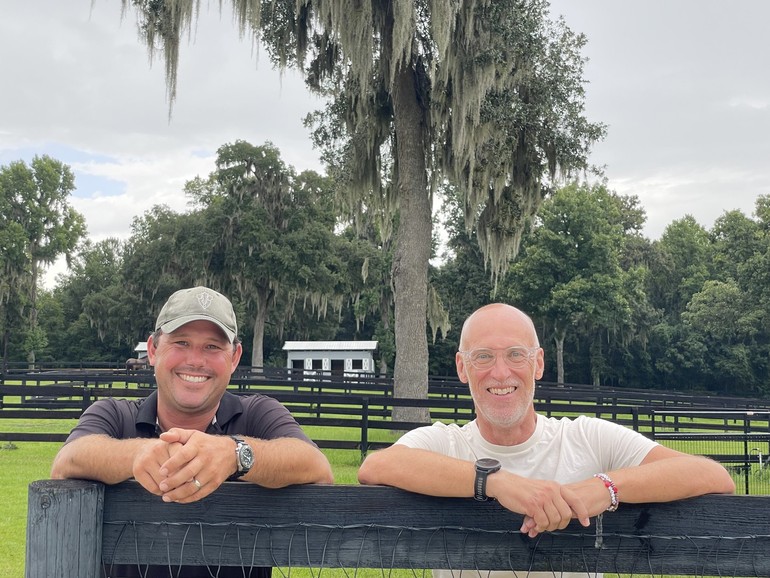Christian Dietz, CEO of Equine 74, sat down with American showjumper and coach August Torsilieri to discuss his career, philosophy on horse management, and his approach to maintaining equine health and performance, with a particular focus on gastric health. This exclusive interview is published on World of Showjumping.
Christian Dietz: August, thank you for taking the time to speak with us today. Let’s start at the beginning—your name, Torsilieri, isn’t a typical American surname. What’s the story behind it?
August Torsilieri: Thank you for having me! Yes, my last name has Italian roots—my great-grandfather came from Florence, Italy, back in the early 1900s. I was born and raised in beautiful Hunterdon County, New Jersey, which sits between New York and Philadelphia. It’s a stunning countryside, and my family had a 27-acre mini farm with a small stable and ring. That’s where it all started for me.
CD: So your family had a history with horses?
AT: Actually, no! My grandfather owned some racehorses, but no one else in the family was really involved. I was about seven years old when I first became obsessed with horses. My dad, realizing I wasn’t going to let it go, took me to a local lesson barn, and I took to it immediately. Eventually, my siblings got involved, and we just kept adding more horses. I officially opened my business at 18, and it’s been a journey ever since.
CD: Let’s talk about equine gastric health, as this is a crucial topic in our sport. When did you first become aware of stomach issues in horses?
AT: In my program, I’ve become much more aware of how critical the horse’s gastric system is over the last two to three years. Growing up, we always heard about ulcers and gut issues, but back then, it was mostly about giving a tube of UlcerGuard when traveling. Now, I see the long-term effects—weight loss, inconsistent performance, attitude changes. I’ve made it a priority to consistently manage gastric health rather than just reacting when problems arise.
CD: How do you incorporate that into your daily management?
AT: The first step is prevention. Our horses are on a strict management program that includes turnout, controlled feeding schedules, and high-quality forage. We also use Equine 74 Gastric as a daily supplement to maintain a healthy stomach environment. In addition, I closely monitor their stress levels—over-showing can be a huge contributor to gastric distress.
CD: You also use Equine 74 Stomach Calm Paste at shows. What kind of results have you seen?
AT: The paste is an absolute game-changer. I won’t take a horse to a competition without it. It helps buffer stomach acid and keeps them comfortable under stress. I’ve noticed a significant improvement in focus and relaxation, especially in our more sensitive horses. One of our horses had consistent loose manure at shows, and within days of starting Equine 74, it improved dramatically. I see it as an essential part of my program.
CD: How do you handle horses that have already developed stomach issues?
AT: It’s about consistency. If a horse is showing signs of ulcers, we adjust the diet immediately—more fiber, less sugar, and small, frequent meals. We increase their turnout time and reduce unnecessary stressors. The right supplements, like Equine 74, play a big role in keeping them comfortable. But it’s also about understanding each horse individually and making adjustments as needed.
CD: What about crib-biting? Have you seen improvements in horses prone to that behavior?
AT: Absolutely. One of our young horses was a chronic cribber when he arrived. We started him on Equine 74 Gastric, increased his turnout, and within a few months, the cribbing stopped almost entirely. A veterinarian once told me that cribbing can be linked to gastric discomfort—horses create saliva to buffer stomach acid. So if we fix the root cause, we often see a behavioral change as well.
CD: That’s fascinating. Let’s move on to your training program. What does a typical day look like for you?
AT: We start at 7 a.m. with feeding and turnout checks. The first horses are under saddle by 8 a.m., and we ride until early afternoon, mixing in lessons and training. We prioritize cleanliness, regularly power-washing stalls to keep bacteria levels down. In the evening, the horses go out again for night turnout, which helps them relax and keeps stress levels lower.
CD: You have some exciting horses in your barn. Tell us about Glen.
AT: Glen is a Zirocco Blue out of a Julio Mariner mare. He’s incredibly talented but very sensitive. You have to manage him with a lot of attention to detail—his schedule, his gastric health, his stress levels. If you don’t prepare him properly for a competition, he’ll let you know.
CD: You also have MMF Crocodile, a promising young horse. How did you find him?
AT: Believe it or not, we bought him off an Instagram video! I saw one jump and knew he was special. He was enormous when he arrived—already 17.2hh at four—but he’s been the easiest horse to train. He learns from mistakes instantly and has a bright future.
CD: If you could give one piece of advice to riders managing horses with gastric issues, what would it be?
AT: Patience and consistency. Don’t just react—prevent. Look at turnout, diet, and stress management as a whole. Find a routine that works for each horse and stick to it. Products like Equine 74 help maintain that balance daily, but good horsemanship is about looking at the bigger picture.
CD: That’s fantastic advice. Thank you for your time, August!
AT: Thank you—it’s been a pleasure!
Interested in learning more about Equine 74 Gastric? Click here for more information, or feel free to text or call Christian Dietz, CEO of Equine 74:
Europe: +49 172 5184099
USA: (352) 207 6857
You can also meet Equine 74 in Ocala—we look forward to welcoming you!










